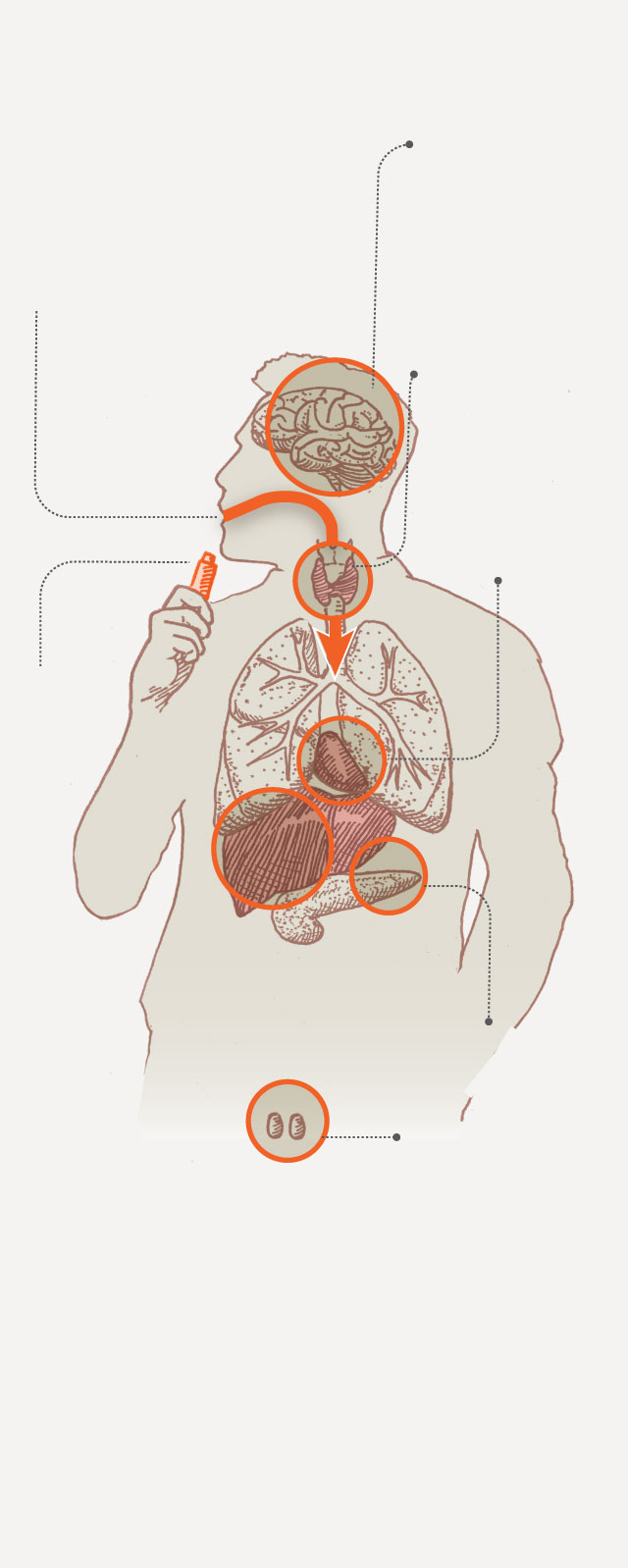
Small amounts,
in time, can
cause:
Inhaling
As much as 82% of pesticides in weed winds up in smoke that is drawn into the lungs. From there those chemicals enter the bloodstream.
Neurological
damage, including
increased risk of
Parkinson’s disease
Thyroid
Thyroid and liver
cancers
Compound threats
When burned or heated, some pesticides break down into toxic gases that include hydrogen cyanide.
Organophosphates combine with cannabinoids to
pose development
risks to offspring,
even before
conception.
Lungs
Loss of appetite,
weakness and heart
failure
Heart
Endocrine
disruption
Pancreas
Liver
Ingesting
Reproductive harm
Your liver will filter out some contaminants in edible products. Regulators therefore allow higher pesticide levels in those products.
• Birth defects and
developmental
delays in offspring

Inhaling
Small
amounts,
in time,
can cause:
As much as 82% of pesticides in weed winds up in smoke that is drawn into the lungs. From there those chemicals enter the bloodstream.
Neurological
damage, including
increased risk of
Parkinson’s disease
Compound threats
Thyroid
When burned or heated, some pesticides break down into toxic gases that include hydrogen cyanide.
Organophosphates combine with cannabinoids to pose development risks to offspring, even before conception.
Thyroid and liver cancers
Lungs
Loss of appetite, weakness and heart failure
Heart
Endocrine
disruption
Liver
Pancreas
Ingesting
Reproductive harm
Your liver will filter out some contaminants in edible products. Regulators therefore allow higher pesticide levels in those products.
• Birth defects and
developmental
delays in offspring

Small amounts, in time
can, cause:
Inhaling
As much as 82% of pesticides in weed winds up in smoke that is drawn into the lungs. From there those chemicals enter the bloodstream.
Neurological
damage, including
increased risk of
Parkinson’s disease
Thyroid and liver cancers
Thyroid
Compound threats
When burned or heated, some pesticides break down into toxic gases that include hydrogen cyanide.
Organophosphates combine with cannabinoids to pose development risks to offspring, even before conception.
Lungs
Heart
Liver
Pancreas
Loss of appetite, weakness and heart failure
Endocrine
disruption
Ingesting
Reproductive harm
Your liver will filter out some contaminants in edible products. Regulators therefore allow higher pesticide levels in those products.
• Birth defects and
developmental
delays in offspring

Small amounts, in time, can cause:
Smoking
As much as 82% of
pesticides in weed winds up
in smoke that is drawn into
the lungs. From there those
chemicals enter the
bloodstream.
Neurological
damage, including
increased risk of
Parkinson’s
disease
Thyroid and liver
cancers
Loss of appetite,
weakness and
heart failure
Thyroid
Lungs
Compound threats
When burned or
heated, some
pesticides break
down into toxic
gases that include
hydrogen cyanide.
Organophosphates
combine with
cannabinoids to
pose development
risks to offspring,
even before
conception.
Heart
Liver
Pancreas
Endocrine
disruption
Reproductive
harm
Ingestion
• Birth defects and
developmental
delays in offspring
Your liver will attempt
to filter out contaminants
in edible products.
Regulators therefore allow
higher pesticide levels in
those products.

Small amounts, in
time, can cause:
Smoking
As much as 82% of
pesticides in weed winds
up in smoke that is drawn into the lungs. From there those chemicals enter the
bloodstream.
Neurological
damage, including
increased risk of
Parkinson’s disease
Thyroid and liver
cancers
Loss of appetite,
weakness and
heart failure
Thyroid
Lungs
Compound
threats
Heart
When burned or
heated, some
pesticides break
down into toxic
gases that
include hydrogen
cyanide.
Organophosphates
combine with
cannabinoids to
pose development
risks to offspring,
even before
conception.
Liver
Pancreas
Endocrine
disruption
Reproductive
harm
• Birth defects and
developmental
delays in offspring
Ingestion
Your liver will attempt to
filter out contaminants
in edible products.
Regulators therefore
allow higher pesticide
levels in those products.

Small amounts,
in time, can
cause:
Smoking
As much as 82% of
pesticides in weed winds up in smoke that is drawn into the lungs. From there those chemicals enter the bloodstream.
Neurological damage, including increased risk of Parkinson’s disease
Thyroid and
liver cancers
Loss of appetite,
weakness and
heart failure
Thyroid
Lungs
Compound
threats
When burned
or heated,
some pesticides break down into toxic gases that
include hydrogen
cyanide.
Organophosphates
combine with
cannabinoids to
pose development
risks to offspring,
even before
conception.
Heart
Liver
Pancreas
Endocrine
disruption
Reproductive
harm
• Birth defects,
developmental
delays in
offspring
Ingestion
Your liver will attempt to
filter out contaminants
in edible products.
Regulators therefore
allow higher pesticide
levels in those products.
LOS ANGELES TIMES